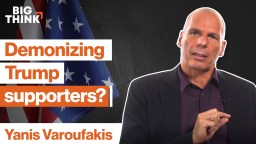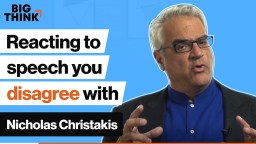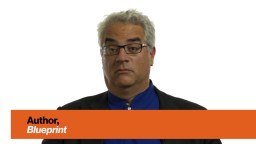debate
Bo Seo, Esther Perel, and Dan Shapiro share their tips for arguing better.
▸
11 min
—
with
“If intelligence is the ability to respond to any argument, wisdom lies in knowing which parts of an argument to respond to.” Harvard debate coach Bo Seo explains how to argue better.
▸
5 min
—
with
How to defeat debaters who deal in distractions, according to a two-time world debate champion.
▸
5 min
—
with
Our impulse to seek out agreement is stifling us, says world debate champion Bo Seo.
▸
4 min
—
with
Bo Seo, Harvard’s former debate coach, explains a good argument.
▸
5 min
—
with
Research has shown how important empathy is to relationships, but there are limits to its power.
▸
11 min
—
with
7 scholars and legal experts dissect what you can and can’t say in America.
▸
22 min
—
with
Most people believe you can win an argument with facts – but when “facts” are so often subject to doubt, are personal experiences trusted more?
Study confirms the existence of a special kind of groupthink in large groups.
Imagine Heraclitus spending an afternoon down by the river…
A 2020 study published in the journal of Psychological Science explores the idea that fake news can actually help you remember real facts better.
What speech is harmful, how do we know, and what do we do if we find out?
While this has been a popular debate, the evidence suggests there isn’t a strong link between pornography use and erectile dysfunction (ED).
There are many reasons why this could be true.
Master negotiator Chris Voss breaks down how to get what you want during negotiations.
The proposal calls for the American public to draft two candidates to lead the executive branch: one from the center-left, the other from the center-right.
There are ways to engage with someone with whom you don’t agree.
▸
4 min
—
with
If you’re right all the time, you’re probably doing something wrong.
▸
4 min
—
with
Practicing Socratic ignorance, or avoiding certainty of our own knowledge, diminishes inequality and pushes us in our search for wisdom.
▸
6 min
—
with
You can’t really have an opinion if you don’t know all sides of the argument.
▸
5 min
—
with
Taking time for thoughtful consideration has fallen out of fashion, writes Emily Chamlee-Wright. How can we restore good faith and good judgement to our increasingly polarized conversations?
Disagreements should not equal censorship.
▸
3 min
—
with
“One way the internet distorts our picture of ourselves is by feeding the human tendency to overestimate our knowledge of how the world works,” writes philosophy professor Michael Patrick Lynch.
Considering strands of liberalism and how each determines right from wrong.
▸
with
Social media giants aren’t legally obligated to protect free speech. But they should. Former ACLU president Nadine Strossen explains why.
▸
7 min
—
with
The key to changing hearts and minds for a better world? Lead with love, says Senator Cory Booker.
▸
5 min
—
with
The countdown is on for our top 10 videos of the year! Want to be smarter than you were yesterday? This video will teach you to have better conversations using 3 key design principles.
▸
5 min
—
with
From “if-by-whiskey” to the McNamara fallacy, being able to spot logical missteps is an invaluable skill.
Our opponents’ objections to our ideas often contain insight as to how we can better refine them.
▸
2 min
—
with
A guide to keep conflicts from flaring up while you pass your uncle the pumpkin pie.
▸
2 min
—
with





























